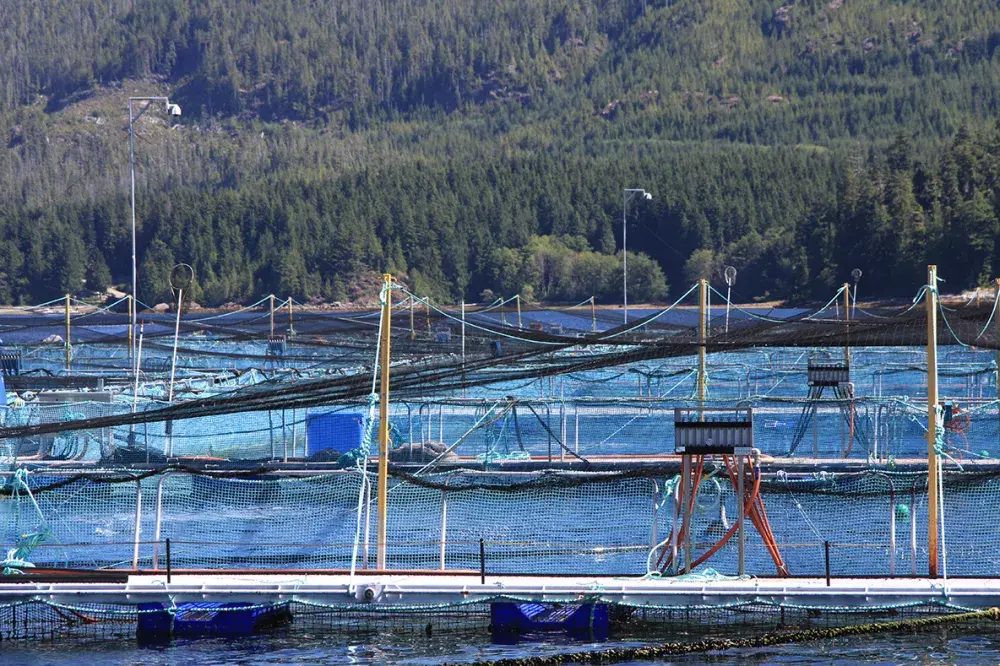Fish farm operators are confident that a recent decision in Washington state to ban the raising of Atlantic salmon will not affect the industry in British Columbia, according to the B.C. Salmon Farmers Association.
Washington state’s senators voted to phase out the aquaculture practice on March 2, following the collapse of a net-pen in August 2017 from a facility by Cypress Island, east of Victoria, B.C. That collapse released nearly 160,000 Atlantic salmon into the Pacific.
“Recent developments have thrown into stark relief the threat that non-native marine finfish aquaculture may pose to Washington's native salmon populations,” read the recently passed bill. “But just as evidence has emerged that non-native marine finfish aquaculture may endanger Washington's native salmon populations, so too has evidence emerged that marine finfish aquaculture in general may pose unacceptable risks, not only to Washington's native salmon populations, but also to the broader health of Washington's marine environment.”
“This is clearly an emotional response by the State of Washington to a single mass escape at one farm,” said Jeremy Dunn, executive director of the B.C. Salmon Farmers Association. “This decision wasn’t based on science, because science tells us that Atlantics in the Pacific pose extremely minimal risk because they biologically can’t interbreed with native Pacific [salmon]. There’s no evidence that they can establish in the wild here.”
Following the Aug. 21 collapse, Atlantic salmon were caught in Ahousaht territory, north of Campbell River and in the Fraser River on B.C.’s mainland. After just three cases of Atlantic salmon were confirmed in B.C. waters by Fisheries and Oceans Canada over the previous six years, over 40 samples were sent to the DFO’s Atlantic Salmon Watch Program last fall, plus additional reports of the species discovered on the West Coast. But these fish were found with undeveloped sex organs, and reports to the DFO diminished towards the end of 2017.
This has not subdued calls from some groups to remove Atlantic salmon from Canada’s West Coast. The Union of BC Indian Chiefs has advocated that all fish farms be land-based, and members of six First Nations on the east side of Vancouver Island have lobbied for the provincial government to ban net-pens from the Broughton archipelago. After the Washington State collapse in August this group occupied a Marine Harvest facility near Alert Bay for two months.
“I stand with First Nations in B.C. in their long struggle with federal and provincial governments to fully recognize and address the threat of salmon fish farms to wild salmon,” stated Assembly of First Nations National Chief Perry Bellegarde during the occupation. “First Nations have long identified the threat of the fish farm industry to wild salmon that have sustained our peoples for generations. Wild salmon is an integral part of the ecosystem and a central part of First Nations cultures on the West Coast.”
B.C. Premier John Horgan also delivered a statement on the situation after visiting the ‘Namgis First Nation to hear concerns.
“Any strategy for aquaculture must put a priority on the protection of wild salmon, collaborate with First Nations and acknowledge their interests, involve the federal government and recognize that the industry now generates nearly $800 million in annual value, while supporting several thousand jobs in rural and coastal areas,” he said.
“We haven’t been able to even have a long-term engaged discussion, let alone develop an agreement,” said Dunn of the occupation near Alert Bay, adding that aquaculture agreements with First Nations accounts for approximately three quarters of the industry’s production in B.C. “We’ve been at this a long time, and our members believe it’s incredibly important. None of these agreements were achieved through an easy road. They were all achieved through lengthy discussions, a great understanding of building a shared respect.”
In Nuu-chah-nulth territory these agreements include arrangements between the Tla-o-qui-aht First Nation and Creative Salmon, and Cermaq’s deal with Ahousaht. Thirty per cent of Cermaq’s workforce is First Nations, making it a major employer for the Ahousaht community, which hosts several Cermaq pens in its waters.
Cooke Aquaculture blamed the Aug. 21 collapse on tidal changes cause by a solar eclipse, despite areal footage showing other intact net pens in the area near Cypress Island. Dunn said that the existing regulations combined with investments from aquaculture operators would make such an incident very unlikely north of the border.
“It would be a very freak accident for something like that to happen here, and I would argue that it probably couldn’t given the level of investment on farms and the way that they’re anchored, moored and engineered in the marine environment,” he said.
A recent incident on Vancouver Island could prove to affect B.C.’s salmon farming industry more than last year’s disaster in Washington State. In November photographer Tavish Campbell released underwater footage of blood-red effluent spilling into the Pacific from processing plants by Campbell River and Tofino. The fish from these plants were farm-raised, and Campbell said testing determined the effluent was diseased. The province has not confirmed this, but is currently conducting a review of 30 fish processing discharge permits.
“Five of those fish plants process farm-raised salmon exclusively,” said Dunn, who anticipates that the review could lead to more transparency in how these plants are reporting their information. “We expect that B.C. will update its permits at these plants, which they have indicated to us that they plan to do.”







